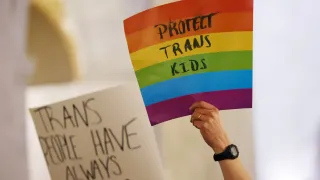November 1, 2020
LGBTQs Suffering More as Pandemic Sharpens Disparities
Kilian Melloy READ TIME: 3 MIN.
From HIV testing to mental health services to LGTBQ youth having what they need to thrive, the COVID-19 pandemic may be having more serious effects on sexual minorities than on heterosexuals and cisgender people, CNBC reports.
The ongoing health crisis is sharpening disparities that had already existed, given that LGBTQ Americans are a demographic that "tends to face higher rates of cardiovascular diseases, obesity and other health problems that research suggests can make a coronavirus infection more severe," CNBC notes.
"They also experience higher rates of illicit drug use, homelessness, isolation, anxiety, depression and suicide and often face barriers to health care," medical experts say.
Dr. Barbara Taylor, an infectious diseases expert, reiterated that observation. "Everything about this pandemic has highlighted existing structural inequities," she told CNBC. "This pandemic is highlighting inequities in the LGBTQ community just like it's highlighting inequities in communities of color. COVID just shines a spotlight on the injustices in our system."
The Human Rights Campaign has conducted research into the ways in which the pandemic and its effects are especially challenging for non-heterosexual and non-cisgender people, who may face bias in trying to remain employed and in seeking health care. A research brief published by the HRC outlines the hardships and unique challenges faced by LGBTQ elders, youth, and workers, taking note of greater trends in poverty, barriers to health care, coverage gaps, and other shortfalls that already affected LGBTQ Americans to a greater extent than their heterosexual peers.
Even among the LGBTQ community, certain populations seemingly remain more vulnerable than others. Transgender Americans are among those who have been hit "very hard," said Tomi Clinton, who is the head of Cathedral City, California's Transgender Health and Wellness Center. The economic devastation wrought by the pandemic has left many trans people in desperate financial straits, sending some of them into sex work in order to survive. Thomi said she's seen a corresponding rise in suicidal thoughts and even attempted suicides.
LGBTQ youth - always among the community's most vulnerable members - face additional stresses and pressures, noted Dr. Sarah Ketchen Lipson, who is with Boston University's School of Public Health.
With many college students unable to attend classes in person, LGTBQ college students people may be more isolated and less supported than they normally would be; Dr. Lipson told CNBC that "many young people find or have a stronger sense of community when they arrive at the campus, and that's particularly true for sexual and gender minorities."
Earlier this month The Trevor Project released the findings of a poll that echo such concerns. Among the results: "Nearly 1 in 4 LGBTQ youth who responded said they were unable to access mental health care because of the pandemic," NBC Out reported.
There are other ways in which the pandemic and its effects are affecting the LGBTQ community. One crucial area of impact: HIV testing. Citing Dr. Taylor, CNBC pointed out that "many outreach programs were forced to suspend services because of the pandemic. The result could lead to a rise in people who don't realize they have HIV, a virus that disproportionately impacts gay and bisexual men," the article added.
Much of the evidence for the impact is anecdotal, keenly observed by medical health professionals but not as easily quantifiable as health challenges faced by other demographics since, as Dr. Jesse Ehrenfeld pointed out, "LGBTQ people are often invisible when it comes to data collection in a variety of contexts, including health care" even in normal times.






